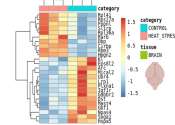'Mathematical microscope' reveals novel, energy-efficient mechanism of working memory that works even during sleep
UCLA Health researchers have discovered a mechanism that creates memories while reducing metabolic cost, even during sleep. This efficient memory occurs in a part of the brain that is crucial for learning and memory, and ...
May 8, 2024
0
44









